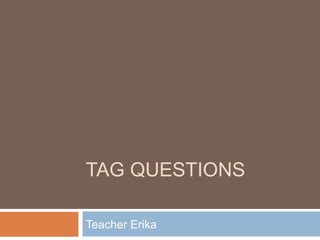Report
Share

More Related Content
What's hot (20)
Similar to Tag question
Similar to Tag question (20)
Tag question
- 2. Tag Question or Question Tag Mini-questions that we often put at the end of a sentence in spoken English In question tags, we use anauxiliary verb (have, was, will, do, does, did) Example: Karen plays the piano, doesn´t she? You didn´t lock the door, did you?
- 3. Structure Normally we use a ne g a tive question tag after a p o s itive sentence: Mary will be here soon, won´t she? There was a lot of traffic, wasn´t there? Jim should pass, shouldn´t he?
- 4. ... And a p o s itive question tag after a ne g a tive sentence: Mary won´t be late, will she? They don´t like us, do they? You haven´t got a car, have you?
- 5. And the answer means... You´re not going out today, are you? Yes = Yes, I am going out. No = No, I am not going out.
- 6. And the question means... Depends on how you say it: If the voice goes down, you´re not realy asking a question, you´re just inviting the listener to agree with you: It´s a nice day, isn´t it? If the voice goes up, it is a real question: You haven´t seen Mary today, have you?
- 7. After... Let´s ...the question tag is shall we? Let´s go out, shall we? Imperative...the tag is usually will you? Open the door, will you? First person in the simple present of to be... The question tag is... Aren´t I? I´m too fast, aren´t I?
- 8. Always use... A pronoun to do the tag: He won´t come, will he? If the subject is no thing , use it: Nothing else matters, does it? If the subject is everybody, somebody, nobody, use they: Nobody liked it, did they? Because of negative meaning in the first sentence, the tag is positive: He never studies for the test, does he?
- 9. Practice:
- 10. Practice:
